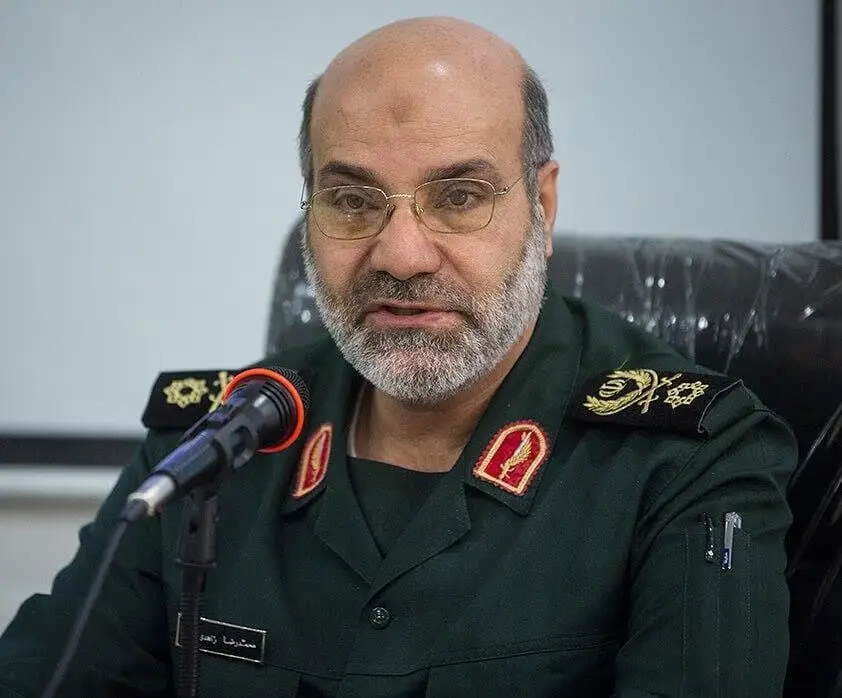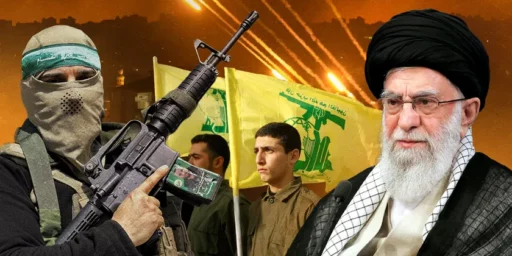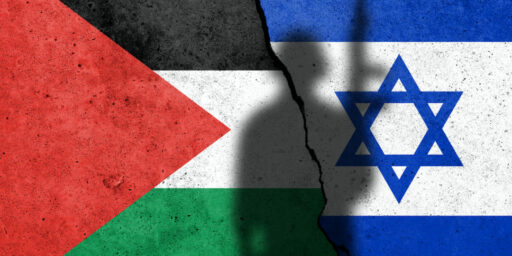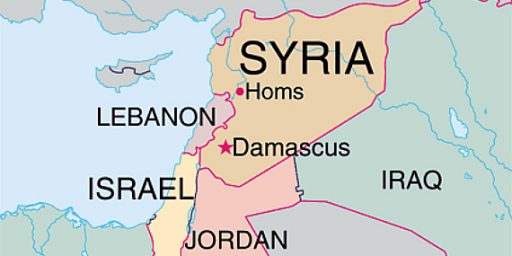Israel Kills Qud Force Leaders; Iran Vows Revenge
Another escalation in the longstanding "shadow war."

WaPo (“Israeli strike on Iranian Consulate in Damascus kills key commander, Iran says“):
An Israeli airstrike hit a building next to Iran’s embassy in the Syrian capital of Damascus on Monday, killing two senior members of Iran’s Islamic Revolutionary Guard Corps, Iranian state media reported, a significant escalation in a region that continues to be roiled by the war in Gaza.
The strike killed senior commander Mohammad Reza Zahedi and Brig. Gen. Mohammad Hadi Haj Rahimi, along with five other officers, according to a statement from the IRGC.
“Iran reserves its legitimate and inherent right under international law and the United Nations Charter to take a decisive response to such reprehensible acts,” Zahra Ershadi, Iran’s ambassador to the United Nations, wrote late Monday in a letter to the U.N. secretary general.
Israel’s military, which typically does not confirm strikes in Syria, declined to comment.
Israel has carried out strikes in Syria against Iran and its allies for years and throughout its six-month military campaign against Hamas in Gaza. But Monday’s attack stood out both because of its location — in a diplomatic compound, traditionally exempted from hostilities — and because of the seniority of the apparent target.
Zahedi was identified as the head of Iran’s Quds Force in Lebanon in a 2010 Treasury Department sanctions announcement that accused him of playing “a key role in Iran’s support to Hizballah.” He acted as “a liaison” between the Lebanese militant group Hezbollah and Syrian intelligence and was “charged with guaranteeing weapons shipments,” according to the Justice Department statement.
In a statement, Hezbollah eulogized Zahedi as an “exemplary sacrificer in his love for the resistance in Lebanon and the region” and warned that “this crime will not pass without the enemy receiving punishment and revenge.”
As head of the IRGC in the Levant, Zahedi ran day-to-day operations in Syria and Lebanon, according to Arash Azizi, an Iran analyst and historian.
“IRGC leadership who are on the front lines of the states neighboring Israel are high-value targets,” said Azizi, “especially those involved in conducting operations with Hamas and Hezbollah.”
What makes Monday’s strike “escalatory and unprecedented,” Azizi added, is that “the building where Zahedi and his colleagues were hit is owned by Iran, and it’s next to the embassy.”
BBC (“Iran accuses Israel of killing generals in Syria strike“) adds:
But Monday’s attack will be seen as a serious escalation.
The Israelis appear to be testing the resolve of the Iranians and their allies and signalling that they are serious about increasing pressure on their enemies.
The Israelis are looking at the fact that both Iran and Hezbollah have not been pushing as hard as some might expect. Now they will see if Iran and Hezbollah are going to push back.
There will be a response, but it may not be the one people expect. Rather than missiles, it may be some sort of cyber-attack.
WSJ (“Israel Blamed for Attack Killing Iranian General in Damascus“):
The Israeli military’s chief spokesman, Rear Adm. Daniel Hagari, told reporters: “We are focused on the war goals and we will continue to do anything that contributes to achieving those goals,” declining to comment further on the event. U.S. officials said they were aware of the reports but declined to comment.
Israel and Iran have engaged in a long-running covert war across the Middle East in which Israel has carried out hundreds of airstrikes targeting Iranian targets and their allies. Iran has blamed Israel for killing Iranian nuclear scientists and military leaders. Iran, meanwhile, has built up a network of militia allies arrayed against Israel in Syria, Lebanon, Yemen and Iraq.
Since the start of the war in Gaza last year, the slow-burning conflict has come to a boil, with Israel trading fire regularly with Lebanon’s Iran-backed Hezbollah movement. Hamas, the Palestinian militant group that carried out the Oct. 7 attack on Israel that sparked the war in Gaza, is also a client of Iran.
Monday’s strike could signal a new phase of the two foes’ undeclared war, with Israel taking a more aggressive action against Iran’s shadow network in the region. That network is designed to give Tehran the ability to strike adversaries such as the U.S. and Israel without engaging in a direct conflict, security analysts said.
“This is Israel telling the Iranians: Your forward-defense strategy isn’t going to work anymore,” said Randa Slim, a senior fellow at the Middle East Institute in Washington. “Israel is saying to them, we are in a new realm and we are going to hit you wherever and whenever we can.”
CNN (“Iran vows revenge as it accuses Israel of deadly airstrike on Syria consulate in deepening Middle East crisis“) adds:
Iran and Syria accused Israel of authoring the attack, with Tehran warning of a “serious response,” and the powerful Iran-backed Lebanese militant group Hezbollah saying the strike will be met with “punishment and revenge.” Iran also said it would hold the United States “answerable” due to its support of Israel.
Iranian President Ebrahim Raisi on Tuesday blamed Israel for the attack and said it will “not go unanswered,” state news agency IRNA reported.
The Israeli military told CNN it does not comment on foreign reports. However, a military spokesperson said Israel believes the target struck was a “military building of Quds forces” — a unit of the IRGC responsible for foreign operations.
“According to our intelligence, this is no consulate and this is no embassy,” Israel Defense Forces spokesperson Rear Adm. Daniel Hagari told CNN. “I repeat, this is no consulate and this is no embassy. This is a military building of Quds forces disguised as a civilian building in Damascus.”
Axios (“U.S. tells Iran it ‘had no involvement’ in Israel strike“) adds:
The U.S. told Iran that it “had no involvement” or advanced knowledge of an Israeli strike on a diplomatic compound in Syria that killed a senior Iranian general, according to a U.S. official.
The big picture: The rare message shows the Biden administration is deeply concerned that the Israeli strike could lead to a regional escalation and the resumption of attacks by pro-Iranian militias against U.S. forces.
[…]
Behind the scenes: Israeli intelligence has been following Zahedi, who was in charge of arming and coordinating with Hezbollah and other pro-Iranian militias in Lebanon and Syria, for a long time.
- An operational window to take him out only opened up in recent days, an Israeli official said.
- Israel notified the Biden administration a few minutes before its air force conducted the strike but didn’t ask for a U.S. green light, Israeli and U.S. officials said.
- A U.S. official said the Israeli heads-up wasn’t detailed and arrived when the military jets were already in the air. The Israelis didn’t tell the U.S., for example, that they were planning to bomb a building in the Iranian embassy compound.
Between the lines: The strike took place shortly before White House national security adviser Jake Sullivan and Secretary of State Blinken started a secure video conference call with top Israeli officials to discuss alternatives to an Israeli ground invasion in Rafah.
The WSJ Editorial Board (“The Iranians Pay a Price in Syria“) is pleased:
Iran paid the first real price Monday for its proxy warfare in the Middle East after Israel killed the leading Iranians sowing chaos in the region. “The most significant assassination since Soleimani” is how the missile strike in Damascus is being reported in Israel. That’s a reference to the January 2020 U.S. strike on Qassem Soleimani, the longtime mastermind of Iran’s foreign terrorism and proxy-war strategy.
[…]
As regional chief of the Quds Force, Zahedi was point man in Iran’s war on Israel. He was the boss of Hezbollah, the Iranian proxy that has fired more than 3,500 rockets, unprovoked, on Israel’s north since Oct. 7, and he gave orders to Syria’s Assad regime as well. Zahedi was responsible for Iran’s weapons transfers to Hezbollah and was believed to be in daily contact with its leader, Hassan Nasrallah.
[…]
Iran has threatened a harsh response, but it can’t say it didn’t ask for escalation. Overnight on Sunday, before the strike on Damascus, an Iranian drone fired from Iraq hit an Israeli naval base in Eilat. This follows Israel’s most successful operation in Gaza, a surprise raid that killed 200 terrorists and arrested more than 500, including senior Hamas and Islamic Jihad leaders, hiding at Al-Shifa Hospital.
The front to watch is now to Israel’s north, where Iran could order Hezbollah to respond with some of its 200,000 rockets and other munitions, including ballistic missiles. Other proxies could also step up the fight against Israel and the U.S.
The stakes, as Iran considers its options, are high. Tehran needs to hear a clear message from the White House. Not criticism to undermine the Israeli government but steadfast support that makes the Ayatollahs think twice before giving an order they would come to regret.
I don’t have strong opinions on the wisdom of the attack at this point. But a few thoughts follow.
- The attack was almost certainly legal. Israel is correct that the building was a military target, not an embassy. Indeed, neither Syria nor Iran are claiming that any diplomatic personnel were killed.
- Quds Force is a terrorist organization. That’s the judgment not only of the US Government but also that of Canada and the EU Parliament.
- “The most significant assassination since Soleimani” is both right and a cautionary tale. Zahedi is one step down the chain of command, the top regional commander rather than the overall leader; a one-star rather than a two-star. While I shed no tears for the death of either man, it’s not at all obvious that Quds is significantly weaker now than it was four years ago when we took out Soleimani. We’ve killed a whole lot of senior leaders of terrorist groups over the last quarter-century. The effectiveness of such “decapitation” strikes is not at all clear.
- While I firmly believe the Biden administration when they say Israel did not provide notice of the attack until it was underway, Iran will rightly reject the notion that we are blameless. We are, after all, Israel’s prime military enabler and the strike was conducted with our most modern fighter jet.
- Iran will certainly retaliate. I haven’t the foggiest, though, how much of an “escalation” it will represent. Iran has been conducting irregular warfare against Israel, and to a much lesser extent, the United States, on a continuous basis since the 1979 Revolution. And Tehran has repeatedly shown that it has no desire for a full-on war with either.






While we (the public) are mostly focused on Gaza, there are so many other conflicts in the region. We have troops stationed in Syria, Iraq, trainers in Jordan and facilities in Qatar, Bahrain, Saudi Arabia and Kuwait. Some 30,000 troops in all. Can it all be reduced to conflict between Iran and Israel? I don’t think so. Iran is trying to throw its weight WRT Saudi Arabia and the Gulf States and vice versa. The various ethnic groups (particularly the Kurds) have their own ambitions. And Turkiye is there with its goals.
Trump, for all his faults, has the instinct to just pull out and let them fight it out. Unfortunately, he was trapped in place by the Christian right and Israel and seduced by the Saudis by waving money in his face.
And no, I don’t have a clue what to do about it all.
US Troops in Middle East: What Are They Doing and Where?
@Scott:
I normally claim omniscience (ahem) but two places I just throw up my hands: Haiti and the Middle East.
@Michael Reynolds: A regular commenter here (I don’t remember who) posted not long after 10/7 that the Middle East is a sandpit full of vipers. I’d modify the description to include the mice on which they feed.
Minor quibble, if the building was a consulate it was probably protected by the Vienna Convention. The idea that one can legally attack another nation’s (Syria’s) third party (Iran’s) consulate without a state of war being declared against either party is most questionable.
Not that Israel gives a damn about any of that, or anything…